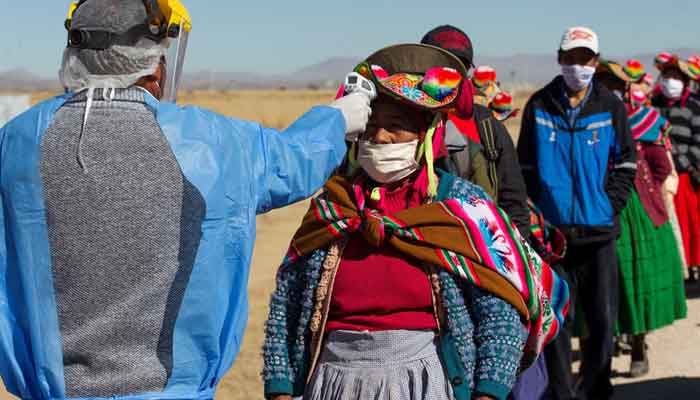Lambda — the new coronavirus variant puzzling scientists due to its 'unusual mutations'
The strain was first detected in Peru and has since spread to 27 countries including the UK
July 04, 2021

Lamba, the latest coronavirus variant that has captured the interest of the World Health Organisation, has left scientists scratching their heads over its "unusual" set of mutations, the Financial Times reported on Friday.
The strain was first detected in Peru and has since spread to 27 countries including the UK. It was initially denoted as C.37.
Public Health England said it detected six cases of the variant between February 23 and June 7 — of whom five had travelled overseas, according to Reuters.
A doctor in molecular biology in Peru's Cayetano Heredia university, Pablo Tsukayama said that when the variant first caught the attention of medics in December, it accounted for “just one in every 200 samples”.
“By March, however, it accounted for about 50% of samples in Lima and now it’s about 80%. That would suggest its rate of transmission is higher than other variants,” he said.
FT, citing WHO, reported that Lambda "accounted for 82% of new COVID-19 cases in May and June in Peru, which has the world’s highest coronavirus mortality rate".
Neighbouring Chile has not been spared its devastating effects either, as it accounts for nearly a third of new cases there.
Is it more transmissible than other variants?
Scientists have yet to rule, however, whether the mutations in Lamba make it more transmissible.
“At the moment there’s no evidence to suggest it’s more aggressive than other variants,” said Jairo Méndez Rico, an adviser on emerging viral diseases at the Pan-American Health Organisatio (PAHO).
“It’s possible that it has a higher rate of contagion but more work needs to be done on it.”
Lambda was designated this June by the WHO as the seventh “variant of interest” so far.
The global health body believes that the other four more widely reported strains are of greater concern — Alpha, Beta, Gamma and Delta which were first detected in the UK, South Africa, Brazil and India respectively. It says that the Lamdba variant, however, does need to be closely watched.
Following the WHO's announcement, on June 23, the PHE said Lambda is a variant being investigated “due to international expansion and several notable mutations”. It clarified however that no evidence points towards it being a more severe form of the disease or one that diminishes the efficacy of vaccines.
“One reason why it is hard to make sense of the threat from Lambda, using computational and lab data, is that it has rather an unusual set of mutations, compared with other variants,” FT reported, quoting Jeff Barrett, director of the COVID-19 Genomics Initiative at the Wellcome Sanger Institute in the UK.
According to Barrett, since there aren't many genetic sequencing facilities in Latin America, it is difficult to ascertain how much of the outbreak there is driven by the Lambda strain.
'Potential to become variant of concern'
According to FT: "Lambda has a unique pattern of seven mutations in the spike protein that the virus uses to infect human cells. Researchers are particularly intrigued by one mutation called L452Q, which is similar to the L452R mutation believed to contribute to the high infectiousness of the Delta variant."
A study was carried out by Monica Acevedo and her colleagues at the University of Chile, Santiago, that involved analysing blood samples from local healthcare workers to study the effect of Lambda on viral infectivity. The health workers had received two doses of the Chinese CoronaVac vaccine.
The findings, published on Thursday, seem to indicate Lambda is more infectious than Gamma and Alpha and is more capable of escaping the antibodies produced by vaccines.
“Our data show for the first time that mutations present in the spike protein of the Lambda variant confer escape to neutralising antibodies and increased infectivity,” read the findings.
A patient infected with the Lambda variant in Brazil, where Gamma has been the dominant strain, was studied by a group of researchers in the city of Porto Alegre.
"Considering that this variant has rapidly spread in Peru, Ecuador, Chile and Argentina, we believe that Lambda has a considerable potential to become a variant of concern,” the researchers wrote in a paper that has yet to be peer-reviewed.
Latin America hit hardest by pandemic
Latin America has been the region hit hardest by the pandemic. With a population that is just 8% of the world's, it has 20% of the coronavirus cases. There has been an uptick in cases in Colombia, Paraguay and Uruguay in recent weeks.
“While we’re seeing some reprieve from the virus in countries in the northern hemisphere, for most countries in our region the end remains a distant future,” PAHO director Carissa Etienne said this week.
Etienne said that cases are on the rise in countries including Colombia, Brazil, Bolivia and Uruguay and that hospitals were struggling to expand intensive care units.
“Despite this worrisome picture, just one in 10 people in Latin America and the Caribbean have been fully vaccinated against COVID-19 — an unacceptable situation,” she said.











